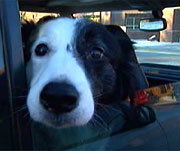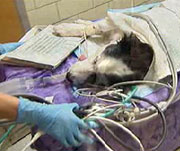Unleashing a Cure
Sunday, February 24, 2008
(Editor’s note: The following is reprinted with permission from WTHR TV, Indianapolis, Ind.)

Lucy [Cordes] is full of life
despite a cancer diagnosis.
by Mary Milz/Eyewitness News
West Lafayette - If someone you know or love has cancer, there's new hope thanks to a discovery made at Purdue University.
Biochemist Dr. Phillip Low has found a way to target and kill cancer cells without killing healthy cells. It's a treatment veterinarians at the Purdue School of Veterinary Medicine hope will save a dog named Lucy.
Lucy is the companion of WTHR Executive Producer [and SHR representative] Margaret Cordes.
Margaret found out about the research after her ten-year-old Border collie mix developed a rare type of cancer that can spread quickly.
"I noticed her legs were swollen," Margaret recalled.
When she took Lucy to the vet, "She felt her joints and right away she looked a me and said, 'These joints are warm and that's not good.'"
Lucy has transitional cell carcinoma, or TCC, which is similar to invasive bladder cancer in people.
Her vet referred Lucy to Purdue where veterinarians removed a large mass from her abdomen. It was the size of a melon and involved one of her kidneys. The surgery was risky but successful.
Surgeons were hopeful until they spotted another tumor in Lucy's liver. The news was devastating for Margaret.
"A lot of people say, 'A dog is a dog.' Well, a dog is a part of a lot of people's families and this dog has been part of mine for ten years," Margaret said.
It's why Margaret volunteered Lucy for a study through Purdue's Comparative Oncology Program. The study could make medical history.
"For me it's not a choice. You have to try it," Margaret said. "I wasn't going to put her down with so much life in her. I wasn't ready for that and she wasn't ready for that."
In late January, Lucy became the first dog with cancer to undergo a diagnostic test developed by Dr. Low.
As Chief of Clinical Oncology Dr. Deborah Knapp said, "[This] visit is all about learning how extensive Lucy's cancer is. Then with this information the next step would be to begin treatment."

Dr. Deborah Knapp,
Chief of Clinical Oncology
Veterinary techs began the procedure by injecting Lucy with a radioactive dye that seeks out and sticks to certain cancer cells, making them easy to spot under a special camera.
As Dr. Knapp said, that allows them to know where the cancer is "without having to biopsy all those sites."
What researchers didn't know before injecting Lucy was if the radioactive dye would stick to the type of cancer cells she has.
After sedating her, they placed Lucy under a special camera and watched the images of her unfold on a computer screen. Certain areas glowed or lit up, indicating the presence of tumors. The test was working. The dye was sticking to the cancer cells.
The medical team, led by Dr. Ryan Rothenbuhler, was ecstatic.

Dr. Ryan Rothenbuhler led
the medical team that treated Lucy.
"We know in humans there are folate receptors in tumors, but we've never done a dog," Rothenbuhler said.
What they found was promising not just for the study but for Lucy as well.
Researchers believe this same method of detecting cancer also could be used to treat it, sending cancer-killing drugs only to the tumor, not to healthy cells like standard chemo does now.
Rothenbuhler told Margaret Lucy's test could mark a turning point in their research.
"I have a company that would potentially like to license their cancer therapy. To be able to go to them and say, 'Look, we have our first tumor,' might jump them on board and put some money into it and [having Lucy here] could potentially help," he said.
That company is Endocyte, Inc., also based in West Lafayette. This is about more than helping Lucy, as her cancer is similar to a type of bladder cancer in humans.
"And in humans there is still a great need to improve the methods to detect and treat it," Dr. Knapp said. "Therefore, what we learn in dogs may help us figure out better ways to deal with this cancer in humans."
The significance was not lost on Margaret, whose 80-year-old father has been fighting bladder cancer for ten years.
"I thought to myself, 'Oh, my gosh, if this can help in the future, someone else when their father has bladder cancer or they have it, there may be a way to treat it earlier,'" she said.
Lucy received standard chemotherapy following the first test. The Purdue vets are quick to point out that the side effects of chemo are usually less severe in dogs than in people. Lucy was back to chasing squirrels in her backyard the following day.

Lucy keeps a paw on her medical chart.
Three weeks later, she returned for a repeat test. It indicated the cancer had spread. But this time, instead of standard chemo, Lucy may become the first dog to receive the targeted treatment.
Margaret knows it probably won't save Lucy's life.
"You always wonder why is this happening," Margaret said. "And I can't make her live two, three, four or five more years but if I know I've done everything I can do and that we've found something, then maybe someone else won't have to go through this. You have to keep trying."
Margaret says Lucy is doing great on the treatment, with daily walks and begging to play ball. Lucy's veterinarians remind us that dogs do not suffer through chemotherapy like humans do.
Editor’s note: Margaret Cordes reports that researchers are also using this imaging to find joint inflammation in horses.
|